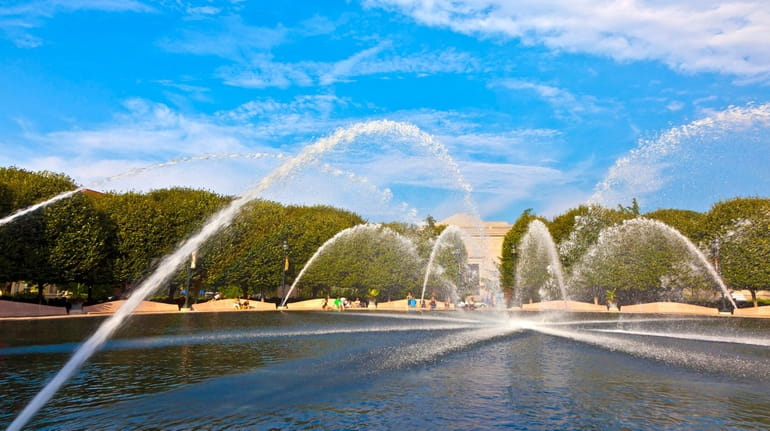A guide to reopened museums and gardens in the D.C. region

A breathtaking fountain in the sculpture garden of the National Gallery of Arts in Washington, D.C. Credit: Getty Images/Meinzahn
The coronavirus pandemic continues to have a major impact on Washington's cultural institutions even as the region begins to reopen. The responses differ by institution: The Kennedy Center has canceled most performances through the end of 2020. The Smithsonian is taking things slowly, using the analogy of a dimmer switch, rather than just flipping the lights back on, while its museums remain closed.
But other attractions have swung open the doors to their buildings and sculpture gardens. Safety is obviously a concern, with stringent social distancing precautions: "Thou shalt wear a face mask" is one of the Museum of the Bible's "Covid Commandments," while the Spy Museum provides a "spy gadget," or stylus, for use with touch screens, elevator buttons and any other surface that might spread germs. The National Gallery of Art's Sculpture Garden has designated entrance and exit gates to control crowd flow.
Fully reopened
Hillwood Estate and Gardens: Marjorie Merriweather Post's estate reopened to the public June 27. Capacity will be limited to help with social distancing, so visitors are required to make separate timed-entry reservations for the 25-acre gardens, the mansion and exhibitions. (There's no additional fee for admission to the mansion and exhibition.) Open Tuesday through Sunday. $5-$18. Ages 5 and younger free.
International Spy Museum: The museum, which moved to an expansive new building in L'Enfant Plaza last year, has reopened with a limited capacity and extra distancing. (The museum now recommends a minimum of two hours to explore.) Many of the interactive elements have been modified to reduce contact, but some elements are temporarily closed — including the sections in which visitors crawl through an air duct, and attempt to escape East Berlin by hiding in a Trabant. "An interactive like the Air Duct is exceptionally difficult to transition to an appropriate touchless form, so we will not make it available at this time," Spy Museum media relations manager Aliza Bran explained in an email. However, staff members have created alternatives in the space: The Trabant on display has a mannequin demonstrating the contortions needed to fit into a hidden space in the car. Open daily. $16.95-$24.95. Ages 6 and younger free.
Museum of the Bible: Even beyond the coronavirus, it's been a rough year for the Museum of the Bible, which forfeited a rare cuneiform tablet in May because federal authorities believe it entered the country illegally. In March, it was revealed that 16 texts displayed as fragments of the Dead Sea Scrolls were actually modern fakes. But the museum is moving ahead. Most of its interactive exhibits are open, as is the Milk and Honey Cafe. (The Virtual Reality Tour of the Lands of the Bible and the hands-on children's area are closed.) Procedures to limit contact are in effect: Visitors will receive styluses to use with touch screens, and are asked to download museum maps to their phones instead of picking up paper copies. Advance tickets are recommended. Open daily. $9.99-$19.99. Ages 6 and younger free.
Partially reopened
Mount Vernon: George Washington's historic estate became one of the first major attractions to reopen in the Washington area on June 21, though, for now at least, social-distancing rules mean visitors can't enter the mansion — it's just too tight a squeeze for groups on the mandatory guided tours — or the distillery. Still, the family-friendly museum is open, minus the theaters and hands-on history area, and all 160 acres of the grounds are open, including the gardens, slave cabins, farming demonstrations and the first president's tomb. Capacity will be limited, so advance ticket purchase is recommended. Open daily. $10-$18. Ages 5 and younger free.
Please note that access to facilities, such as restrooms and cafes, is limited so check before going.
Baltimore Museum of Art: The museum's two sculpture gardens, spread over 3 terraced acres, include pieces by Alexander Calder, Auguste Rodin and Elsworth Kelly. A cellphone tour with commentary is available. Open Tuesday through Sunday. Free.
Glenstone: The much-buzzed-about Potomac art museum reopened as "an outdoor experience" in early June, with visitors allowed to stroll the 300 acres of grounds and admire sculptures by Richard Serra, Michael Heizer and Jeff Koons. Open Thursday through Sunday. Free, reservations required. Tickets are released at 10 a.m. every Monday.
National Gallery of Art Sculpture Garden: The National Gallery's beloved sculpture garden on the Mall reopened June 20 as the first phase of the museum's reopening. There are shorter hours (11 a.m. to 4 p.m., daily), limited capacity (a maximum of 271 visitors) and a new traffic flow, but those are minor inconveniences when you just want to enjoy the enormous central fountain and art by Tony Smith, Barry Flanagan and Louise Bourgeois. Open daily. Free.
William Paca House: William Paca, a signer of the Declaration of Independence and three-term governor of Maryland, lived in this prominent Annapolis home from 1765 to 1780. The walled garden, which has been restored to closely match the original design, includes a picturesque bridge. The mansion is closed, but the garden is open three days per week for self-guided tours, while docents lead themed tours at 11 a.m. and 1 p.m. (For social-distancing purposes, tours are limited to six people, so advance reservations are required.) Thursday through Saturday, 10 a.m. to 2 p.m. $5-$10.
